5 Ways to Ruin Your Yard
5 Ways to Ruin Your Yard
Cultivating gorgeous landscaping isn’t easy. But ruining it is. Here’s a look at five common ways to destroy your yard, according to Lawn Doctor’s Vice President of Operations, Dave Newman.
1. Ignoring harmful tree and plant varieties
Some weeds can overtake your yard and kill your grass. Newman recommends keeping an eye out for crabgrass, dandelions, nut sedge and chickweed. Fortunately, weeds are easy to control if you catch them early. “Simple, ready-to-use weed killers are available at your local home or garden center,” said Newman. “If you need help, contact a local lawn care professional. They’re trained and licensed to apply the right products in the correct amounts.”
2. Neglecting pest control
Ignoring the signs of pest-related blight will result in a ruined yard — and can sometimes even damage your home. According to Newman, cinch bugs, sod webworms and army worms are the main yard-destroying culprits. “If not treated, these pests could damage or destroy your lawn in a short period of time,” Newman said. Pest-control products should eliminate this threat. Read the instructions to ensure your product is appropriate for your yard.
3. Poor planning
Arranging your plants according to their sunlight and watering needs is a critical part of maintaining healthy landscaping. When starting a lawn, there are a number of things you need to consider. “Factors like sunlight, soil type, irrigation and drainage play an important role in your landscaping,” Newman said. “These factors can influence which type of seed or sod should be used in order to ensure a beautiful, healthy lawn around your home.”
You should also choose plants and flowers according to preferred weather conditions. Determine the conditions in the areas you want to plant and then research plants that will thrive in those environments, says Newman.
Placing plants too close together will also cause problems. Tightly packed landscaping can starve smaller plants and result in unhealthy-looking décor. Be sure each item in your landscaping has plenty of room to receive nutrients.
4. Excess mulch or gravel
Too much mulch can smother your plants and prevent moisture from reaching the soil. Newman also warns against using too much gravel. “Gravel in your soil will cause your lawn to dry out very quickly and require more water,” says Newman. Instead of gravel or mulch, Newman recommends using top soil. This will help improve the moisture retention of your soil and cultivate a heathier lawn with less watering.
5. Overcommitting
Exotic or elaborate landscaping looks great at first, but its upkeep can quickly become demanding. Instead, select plants that thrive in your environment. “Choosing plants that are specific to your climate conditions will help reduce the amount of time you spend caring for the plants in your landscaping,” Newman said. He also recommends researching plants and flowers that are compatible with your climate before beginning your project.
Never hesitate to call a lawn pro or use online resources like




Comments
Post a Comment